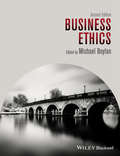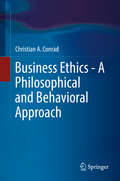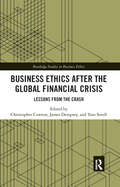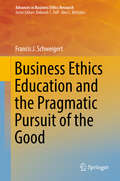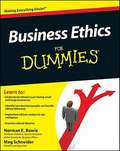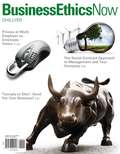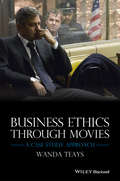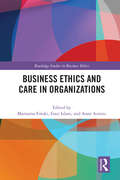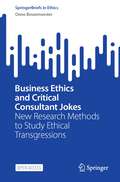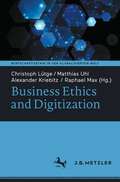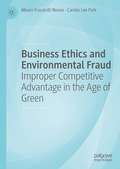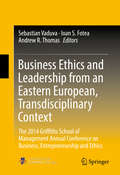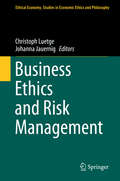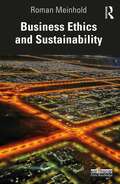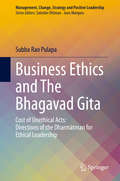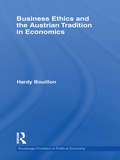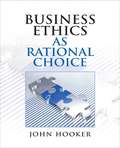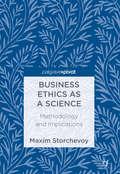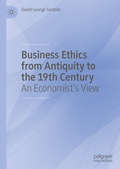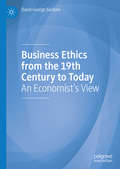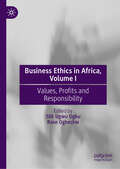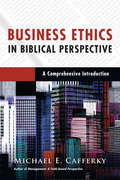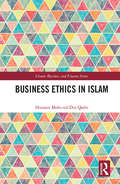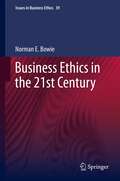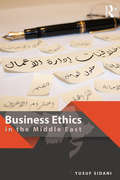- Table View
- List View
Business Ethics
by Michael BoylanThe second edition of Business Ethics introduces readers to key ethical issues that arise within the world of business, providing a strong theoretical foundation as well as real world applications. This new edition has been greatly revised, and includes new sections on the financial services industry, globalization, and global economic justice.An accessible introduction for beginners, offering a combination of important established essays and new essays commissioned especially for this volumeGreatly revised - more than half of the selections are new to this edition. Newly commissioned essays address information technology, global economic justice and globalization, stakeholder theory, the corporation as an individual, and other topicsUses diverse, authentic business cases to illustrate discussion of conceptsCases have been updated to reflect current problems and issuesProvides students with guidance and tools to write their own case study essaysReadings are presented to progressively develop the reader's ability to read and apply ethical theory by writing case responses from different vantage points
Business Ethics - A Philosophical and Behavioral Approach
by Christian A. Conrad Danica WebbThis textbook examines the extent to which moral values play a role as productive forces for the economy, and explores the effect of ethical and unethical Behavior on the economy. It shows how ethics improves productivity in the economy, and provides specific ethics tools for practical application for students and managers. Stemming from an overall interdisciplinary approach, and combining recent research results from sciences such as economics, business administration, Behavioral economics, philosophy, psychology and sociology, this textbook fills a gap in the literature on ethics in business. The book begins with the foundations of business ethics by defining business ethics, delineating its objectives, and discussing the importance of business ethics for business, the economy and society. Next, it presents the ethical evaluation approaches to enable the reader to evaluate economic Behavior ethically. It then explores ‘man in business’, and deals with such issues as Behavior, motivation, ethical orientation, and the presence or absence of a sense of justice. Following this is a discussion of the rules of the market and of questions such as: Does the market economy promote ethical Behavior or is there a conflict of goals between ethics and market economy? Do companies have a social responsibility? The book concludes with an analysis of the importance of ethics for productivity in the enterprise and in the economy, and presents ethics tools as the instruments with which management can promote ethical Behavior of their employees. Following a textbook structure, the book first derives knowledge from scientific studies that is relevant for students, and then summarizes the results. It explains ethical assessment approaches, and then gives an ethical assessment of economic Behavior using case studies. It uses roleplaying and games to explain the Behavior of people in relation to ethics.
Business Ethics After the Global Financial Crisis: Lessons from The Crash (Routledge Studies in Business Ethics)
by Tom Sorell Christopher Cowton James DempseyThe global financial crisis (GFC) that began in 2007 concentrated attention on the morality of banking and financial activities. Just as mainstream businesses became increasingly defined by their financial performance, banks, it seemed, got themselves – and everyone else – into trouble through an over-emphasis on themselves as commercial enterprises that need pay little attention to traditional banking virtues or ethics. While the GFC had many causes, criticism was legitimately levelled at banks over the ethics of mortgage creation, excessive securitisation, executive remuneration, and high-pressure customer sales tactics, amongst other things. These criticisms mirror those that have been levelled at the business more generally, particular in the last decade, although the backdrop provided by the GFC is more dramatic, and the outcomes of supposed wrongdoing more severe. This book focuses on business ethics after the GFC; not on the crisis itself, but how we should respond to it. The GFC has focused minds on the proper role of ethics in the understanding and conduct of business activity, but it is essential to look beyond the crisis to address the deeper challenges that it highlights. The aim of this volume is to present examples of the latest philosophically-informed thinking across a range of ethical issues that relate to business activity, using the banks and the GFC – the consequences of which continue to reverberate – as a point of departure. The book will be of great value to researchers, academics, practitioners, and students interested in business, ethics in general, and business ethics in particular.
Business Ethics Education and the Pragmatic Pursuit of the Good (Advances in Business Ethics Research #6)
by Francis J. SchweigertThis book is an extended argumentfor the critical importance which justice and ethical leadership should have inbusiness ethics education. The book examines the history of ideas and purposesin education, the contemporary role of business schools, and the socialfoundations of moral education to conclude that the pragmatic pursuit of thegood must be a central aim of business strategy. To meet the challenges offacing society today, the masters of business must be moral craftsmen in a justand democratic private property economy that serves the common good. The authorgrounds this vision for business leadership in the centrality of systems ofexchange in human society, in generating prosperity and providing for thegeneral welfare. Business ethics education has focused primarily on moralformation of individual leaders and managers in the context of ethical codes,organizational culture, and legal compliance. Important as this approach is, itfails to generate a sufficient level of business responsibility to satisfylegitimate social concerns regarding the use of natural resources,environmental sustainability, reasonable limitation of systemic risk in capitalmarkets, and fair allocation of goods and services. If the social purpose ofbusiness is not intentionally embraced and diligently pursued, the economy mayenrich a few but impoverish the society, its resources, and its democracy. Hence this book argues for a new vision of business ethics that isgrounded in public accountability of business operations and outcomes for thecommon good, as a matter of justice.
Business Ethics For Dummies
by Meg Schneider Norman BowieThe tools you need to deal with ethical dilemmas in business In today's world, it's increasingly important for all businesses and government agencies to implement ethical conduct in the workplace. Therefore, business ethics has become required coursework for most students in undergraduate and postgraduate business programs. Mapping to a business ethics course, Business Ethics For Dummies examines ethical theory and discusses the moral issues facing corporate America. It covers topics such as conflicts of interest, trade secrets and insider trading, product safety and product liability, hiring, drug testing, sexual harassment, diversity, and much more. The basics of ethics and making ethical decisions How-tos on incorporating business ethics in the workplace A discussion of moral issues facing corporate America Packed with easy-to-understand explanations and examples, Business Ethics For Dummies is a helpful resource for students, professors, business owners, managers, and CEOs who seek a clear understanding of the importance of ethics.
Business Ethics Now
by Andrew GhillyerThis book provides assistance to employees by taking a journey through the challenging world of business ethics at the ground level of the organization rather than flying through the abstract concepts and philosophical arguments at the treetop level. By examining issues and scenarios that relate directly to their work environment (and their degree of autonomy in that environment), employees can develop a clearer sense of how their corporate code of ethics relates to operational decisions made on a daily basis.
Business Ethics Through Movies
by Wanda TeaysBusiness Ethics Through Movies: A Case Study Approach examines a wide range of ethical dilemmas, principles and moral reasoning that arise in contemporary business through a series of popular films and real-world case studies. Engages readers in learning about ethical theory by using movies and both national and international case studies in business as the vehicle for analysis and reflection Facilitates comprehension of ethical issues by showing how characters in films confront issues, make choices, and face the consequences Draws from a variety of actual cases in Business Ethics - from the 1982 Tylenol poisoning and the 1989 Exxon Valdez disaster to recent examples such as the Foster Farms salmonella outbreak and the chemical spill in West Virginia Reveals the important role that ethics plays in setting the moral foundation of a business or corporation Develops critical thinking skills through applying analytical checklists to ethical dilemmas raised in films and in actual cases in Business Ethics
Business Ethics and Care in Organizations (Routledge Studies in Business Ethics)
by Marianna Fotaki Gazi Islam Anne AntoniCare is a human ability we all need for growing and flourishing. It implies considering the needs and interests of others, and the quality of how we relate to each other is often defined by care. While the value of care in private life is widely recognized, its role in the public sphere is contested and subject to political debates. In work organizations, instrumentality frequently overrides considerations for colleagues’ and co-workers’ well-being, while relationships are often sacrificed in the service of performance and meeting organizational targets. The questions this volume attempts to address concerns the organizational conditions that make care flourish and how a caring organization functions in practice. Specifically, we examine what it means to care for each other and what enhances caring behaviours in organizations. The volume ultimately focuses on how caring relations can contribute to making organizations better places. In this perspective, care involves the recognition of, and the limitations of, work as a key aspect of personal and social identity. Because care exceeds the sphere of individual intimacy, the book will also centre on the necessity for building caring institutions through a political process that considers the needs, contributions, and prospects of many different actors. This book aims to contribute to academic discussions on care in organizations, care work, business and organizational ethics, diversity, caring leadership, well-being in organizations, and research ethics. Managers, consultants, policy-makers, and students will find reflections about the goodness of care in organizations, and guidance about the ethical and practical difficulties of pursuing the project of building caring organizations.
Business Ethics and Critical Consultant Jokes: New Research Methods to Study Ethical Transgressions (SpringerBriefs in Ethics)
by Onno BouwmeesterThis open access book offers four ways to enrich traditional research methods in business ethics. By looking at critical jokes and cartoons on management consultants, their business practice and their clients’ demands, many ethical transgressions in business get addressed. By illustrating and criticizing such transgression, jokes can serve as an example in a theoretical argument, as a prompt to reflect on in an open interview, as a statement to assess in an enquiry or as basis for qualitative content analysis. By adding jokes to the conversation on ethical transgressions in business much depth and honesty can be added, resulting in better research data. Jokes can help to surpass social desirability bias included in answers given in traditional interview settings or enquiries. This book is of interest to consultants, researchers, educators and students in business ethics and management. The book showcases what kind of practical and ethical wisdom is embedded in business jokes and how this knowledge can be made productive in the context of business ethics.
Business Ethics and Digitization (Wirtschaftsethik in der globalisierten Welt)
by Matthias Uhl Christoph Lütge Alexander Kriebitz Raphael MaxIn this collection, we bring together various disciplines that are critically engaged in reflecting the diverse aspects of digitization in business, politics, ethics, and education. Accordingly, the volume will provide a provocative discourse space, were the key theoretical and practical problems of implementing ethics in digitization will be discussed and assessed. Moreover, we aim to create a bridge between two (hitherto) mostly separate discourses: the ethical discourse of issues of digitization and the discourse on ethical standards and their implementation in the area of business. These discourses are greatly in need of being joined together, since the vast majority of ethical standards in the field of digitization will have to be implemented by companies, not government agencies, NGOs or other non-profit organisations. We believe that this particular selection of articles is a first step towards creating this bridge.
Business Ethics and Environmental Fraud: Improper Competitive Advantage in the Age of Green
by Mauro Fracarolli Nunes Camila Lee ParkAs environmental legislation grows more stringent in response to the escalating climate crisis, some of the world’s largest corporations have adopted fraudulent mechanisms to keep their margins of profit, and achieve improper competitive advantage. Such mechanisms can lead to problems in the supply chain, a decrease in market value, diminished trust in brands, increased surveillance of companies, as well as damage to the environment. This book offers a holistic view of the nature and consequences of environmental fraud, bringing together practical examples, empirical research data, and management theory. It will be of interest to academics working in the fields of sustainability management, business ethics, and corporate social and environmental responsibility.
Business Ethics and Leadership from an Eastern European, Transdisciplinary Context: The 2014 Griffiths School of Management Annual Conference on Business, Entrepreneurship and Ethics
by Andrew R. Thomas Ioan S. Fotea Sebastian VaduvaThis book aims to provide insight into the fields of business and leadership by examining the role of ethics in these areas. The papers in this book derive from the 2014 Annual Griffiths School of Management International Conference, organized by Emanuel University of Oradea, Romania, where academics and practitioners interacted and discussed current insights and research in the different dimensions of business ethics and leadership. This resulting book offers empirical and theological research on ethics, business and leadership from a transdisciplinary and knowledge- based context. Since the financial crisis in 2008, the debate on business ethics and leadership has dominated the public sphere at all levels of interest, from grassroots to the elites in educational institutions, governments, businesses and NGOs. Naturally, constructive and transdisciplinary discussions need to take place, with due consideration for the specific context of each situation, so that propositions upon which to build the future can be formulated. These discussions unfold in an ever more intricate world of business, powered by ever more pervasive and intelligent technology and scientific development, all brought together by globalization. In this world, organizations are faced with new and more complex ethical issues in their pursuit to serve clients, gain profits, motivate employees, collaborate with partners and act responsibly towards society and the environment. A wise approach to changing the future is to understand the mistakes of the past, because one must always learn how to overcome past mistakes in order to develop a better future. But a necessary approach to building a better future is looking at the world through a transdisciplinary mindset. This allows us to see the world as a complex who≤ it fosters creative interaction between fields of knowled≥ it opens doors for knowledge and innovation flows across disciplines; and it allows the tackling of complex problems and situations. Given the current context of our world, this is an approach that we ought to pursue. Featuring contributions from academics, researchers, scholars and practitioners from across the globe, this book will be of great interest for students and practitioners in the fields of business, leadership and ethics.
Business Ethics and Risk Management (Ethical Economy #43)
by Christoph Luetge Johanna JauernigThis volume explores various aspects of risk taking. It offers an analysis of financial, entrepreneurial and social risks, as well as a discussion of the ethical implications of empirical findings. The main issues examined in the book are the financial crisis and its implications for business ethics. The book discusses unethical behaviour as a reputational risk (e. g. , in the case of Goldman Sachs) and the question is raised as to what extent the financial crisis has changed the banks' entrepreneurial strategy. The book presents an analysis of the reasons leading to the crisis and identifies them as ethical dilemma structures. In addition, it looks at general questions regarding ethical behaviour and risk taking, such as: To what extent does the social embeddedness or abstraction play a role in guaranteeing ethical behaviour? What conclusions can be drawn from institutional or evolutionary perspectives on risk management? Finally, the book discusses further issues that become factors of risk within and between societies, such as work insecurity, corruption or the problem of facilitation payments as a risk in international transactions.
Business Ethics and Sustainability
by Roman MeinholdThis book equips readers with the knowledge, insights and key capabilities to understand and practice business activities from ethical and sustainable vantage points. In our interconnected global business environment, the impacts of business activities are under increased ethical scrutiny from a wide range of stakeholders. Written from an international perspective, this book introduces the theory and practice of ethical and sustainable business, focusing in particular on eco-environmental sustainability, intergenerational responsibilities, current disruptive technologies, and intercultural values of the business community and consumers. Written by an expert author who also brings to the fore non-Western concepts and themes, this book: features positive case studies, as well as transferrable and applicable key insights from such cases; highlights the importance of taking cultural differences into account; takes a transdisciplinary approach which considers findings from research fields including conceptual and empirical business ethics, behavioral economics, ecological economics, environmental ethics, and the philosophy of culture; weaves in pedagogical features throughout, including up-to-date case studies, study questions, thought experiments, links to popular movies, and key takeaways. Written in an accessible and student-friendly manner, this book will be of great interest to students of business ethics, environmental ethics, applied ethics, and sustainable development, as well as business practitioners striving toward ethical, sustainable, and responsible business practice.
Business Ethics and The Bhagavad Gita: Cost of Unethical Acts: Directions of the Dharmatman for Ethical Leadership (Management, Change, Strategy and Positive Leadership)
by Subba Rao PulapaThe author of this book asserts that an absence of ethical leadership and unethical practices were the reasons for major global business scandals such as Enron, Satyam, Lehman Brothers, and WorldCom. This book analyses the causes for these unethical activities and interprets important verses from The Bhagavad Gita to show business executives and leaders how to lead ethically for the greater good of all stakeholders and society. As a remedy to avoid future scandals, the author points to several ethical directions, and the principle of Dharma, mentioned in The Bhagavad Gita by Lord Krishna, a major deity in Hinduism, who is considered Dharmātman (one who imbibes the Dharma). Written in conversation style using an executive education scenario, this book examines real world cases in various sectors like education, medical, non-government organizations (NGOs) and retail using the directions of the Dharmātman.
Business Ethics and the Austrian Tradition in Economics (Routledge Frontiers Of Political Economy Ser. #139)
by Hardy BouillonStakeholder value, corporate social responsibility and sustainability: Are these, and similar, concepts sufficiently clear for fruitful research in business ethics? What is the benchmark to prove their utility? Business Ethics and the Austrian Tradition in Economics is a treatise on the fundamental questions of business ethics and addresses significant shortcomings in the field. It is the result of correlating reflections on phenomena, resulting from an intersection of ethics, economics, methodology, and political and social philosophy. Sparked by the business ethicists’ tendency to consider certain areas outside their field and accept others unquestioningly, this book provides answers in the tradition of Austrian Economics and, in particular, of Hayek and Popper. Through detailed examination and reflection, this book presents the thesis that many themes in business ethics are discussed either unduly intensely, unbalanced or rarely, measured against what business ethics as a science should deliver. It does so by offering an answer to one of the most crucial questions in business ethics, namely that of justice in moral economic actions. Bouillon develops an original definition of morally just economic action in the course of three chapters, and subsequently uses it as yardstick, from which, in chapter four, he reads which of the relevant concepts and topics in business ethics ask for restatement. As a side-product Bouillon discloses logical inconsistencies in prominent political philosophies, and the consequences of these inconsistencies for maldevelopments in business ethics. Business Ethics and the Austrian Tradition in Economics illustrates and analyses the business etchics’ peculiarities particularly within German literature, providing the reader with a focus rarely found elsewhere. This book should be of interest to economics postgraduates and researchers looking at business ethics, economic theory, and social and political philosophy.
Business Ethics as Rational Choice
by John HookerBusiness Ethics as Rational Choice focuses on building decision-making skills so that readers can arrive at, and defend, personal or company decisions in an objective, and convincing, manner.
Business Ethics as a Science: Methodology and Implications
by Maxim StorchevoyThe book considers how to make the methodology of business ethics more scientific, especially its normative branch. Storchevoy explores the attempts of economic theory to contribute to the scientific normative analysis of economic behavior, particularly the welfare economics of 1910-1950 and methodological discussions of economics and ethics from 1980-2015. He then examines the development of the methodological structure of business ethics in general since the 1980s and the scientific validity of normative business ethics, including stakeholder theory, the separation thesis, integral social contract theory, corporate social responsibility, virtue ethics and other frameworks. He concludes by suggesting an additional step to make business ethics a more systematic discipline by developing a typology of moral issues and dilemmas. Business Ethics as a Science will be a thought-provoking resource for students and practitioners of business ethics and economists alike.
Business Ethics from Antiquity to the 19th Century: An Economist's View
by David George SurdamThis book combines elements of economic and business history to study business ethics from antiquity to the nineteenth century. This book begins with so-called primitive people, showing how humans began to exchange goods and commodities from trade as a way to keep peace and prosper. The ancients considered the value and ethics of business, and many of their reflections influenced medieval Catholic thinkers and business participants. Protestants elevated working and profit-making to the respectable and virtuous, and some groups, such as Quakers, came to exemplify good business ethics.This book draws on the work of economists and historians to highlight the importance of changing technologies, religious beliefs, and cultural attitudes, showing that what is considered ethical differs across time and place.
Business Ethics from the 19th Century to Today: An Economist's View
by David George SurdamThis book combines elements of economic and business history to study business ethics from the nineteenth century to today. It concentrates on American and British business history, delving into issues such as slavery, industrialization, firm behavior and monopolies, and Ponzi schemes. This book draws on the work of economists and historians to highlight the importance of changing technologies, religious beliefs, and cultural attitudes, showing that what is considered ethical differs across time and place.
Business Ethics in Africa, Volume I: Values, Profits and Responsibility
by Rose Ogbechie Silk Ugwu OgbuThere is a false assumption that the systemic corruption that exists in significant parts of sub-Saharan Africa is crippling enough to dominate any discussion of business ethics in the region. However, African companies that engage in positive ethical practices are more successful at creating value for society and remaining socially relevant in the long run, which improves their economic outlook. This edited two-volume collection contributes to the growing discussion of business ethics and doing business in Africa. It offers invaluable insights into practical ways of integrating ethics with business operations to enhance corporate values, responsibility, and profitability. This first volume interrogates the intricate relationship between business success, ethics, and stakeholders’ well-being within the nuances and evolving shifts that underpin business in Africa. It restates the significance of business ethics in Africa by providing necessary contexts to the global conversation on integrating business performance with ethical obligations, social responsibilities and sustainability principles. The ideas espoused in the chapters and recommendations offered therein aim to guide academics and practitioners towards finding solutions to the ethical challenges they face in their fields of practice or daily interactions in and out of the workplace. Illuminating key concepts and theories with the help of detailed case studies, this collection will be of great use to scholars and students of business ethics, as well as practitioners and policymakers interested in or working in Africa.
Business Ethics in Biblical Perspective: A Comprehensive Introduction
by Michael E. CafferkyIt is legal for CEOs to make 300 times the amount of the average worker. But is this fair and just? Is it ethical for a customer to purchase a digital camera for the sole purpose of using it on a ski trip and then return the item to the store afterwards? Should companies who purchase advertising space on websites that offer pirated videos for download be held accountable for breaking intellectual property laws? The world of business is fraught with ethical challenges. Some of these are relatively straightforward, but others are complicated and require careful reflection. While there are numerous theories to help people navigate these dilemmas, the goal of this book is to provide a comprehensive biblical perspective on contemporary issues in areas such as consumer behavior, management, accounting and marketing. In Business Ethics in Biblical Perspective, Michael E. Cafferky explores the biblical resources for moral guidance and ethical consideration. He identifies twelve key themes in the narrative of Scripture: cosmic conflict, creation, holiness, covenant relationships, shalom, sabbath, justice, righteousness, truth, wisdom, loving kindness and redemption. By looking at ethical approaches and issues through this multifaceted biblical perspective, Cafferky helps readers appreciate the complex nature of ethical decision making, particularly in the context of business and finance. Designed from the start with the classroom in mind, each chapter of Business Ethics in Biblical Perspective provides example scenarios, questions for intrapersonal and interpersonal ethical reflection, review questions, ethical vignettes for discussion and an exploration of the chapter material in light of the biblical themes. Additional IVP Instructor Resources are also available.
Business Ethics in Islam (Islamic Business and Finance Series)
by Hussain Mohi-ud-Din QadriIslamic Business Finance is based on strong ethical regulations as suggested by Islamic Literature, such as the Quran and the Traditions of the Prophet of Islam, and could be considered as a subclass of the wider subject of ethical standards in business. This book highlights the basic principles of Islamic Business ethics and their implication in today’s global business environment. It highlights the most important features of Islamic banking and finance in relation to the core principles of Shariah law. It is the most comprehensive book to date, in terms of the number of Quranic verses and traditions of the Prophet relating to this subject, which are interspersed throughout the text. It explains how ethics are defined both in general terms and within the context of an Islamic perspective. In addition, it provides a logical interpretation of Islamic principles of business ethics, while keeping in view thethrough the use of contemporary business practices. Topics such as digital currencies, money laundering, etc. are discussed at length. This book also discusses the new and emerging ethical issues faced by business and industry globally. This book will be a valuable reference guide for students, teachers and researchers of Islamic banking and finance.
Business Ethics in the 21st Century (Issues in Business Ethics #39)
by Norman BowieThis work provides a critical look at business practice in the early 21st century and suggests changes that are both practical and normatively superior. Several chapters present a reflection on business ethics from a societal or macro-organizational point of view. It makes a case for the economic and moral superiority of the sustainability capitalism of the European Union over the finance-based model of the United States. Most major themes in business ethics are covered and some new ones are introduced, including the topic of the right way to teach business ethics. The general approach adopted in this volume is Kantian. Alternative approaches are critically evaluated.
Business Ethics in the Middle East
by Yusuf SidaniBusiness Ethics in the Middle East fills a crucial gap in the Middle East educational landscape. Written in an easy and accessible format, this book covers the foundations of business ethics by drawing from both Eastern and Western traditions. The chapters include many examples, case studies, activities, and illustrations that are customized to the Middle Eastern market, yet relevant to readers outside of the Middle East who want thorough insights about business behaviour in the region. A special module introduces the Arab Middle Eastern context that non-Arab readers will find valuable. The author addresses topics related to organizational culture, leadership, CSR, corporate governance, marketing, HR, accounting, finance, and production. This is accomplished with a deep attention to the cultural and contextual elements of the Middle East. Special attention is given to religious business ethics, while still deeply engaging the vast heritage of Western ethical systems. This combination is essential for the development of a comprehensive approach to the topic of business ethics. This textbook will be essential reading for students of business ethics in the Middle East and will also be valuable for students and researchers across business ethics, Islamic Studies, religion, and philosophy.
